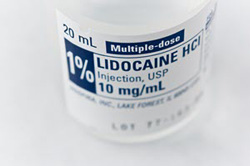Pharmacy Malpractice

Laird Law PLLC is a Las Vegas, Nevada based law firm concentrating on lawsuits for patients and families who suffer injuries due to pharmacy malpractice. Sometimes pharmacy malpractice will cause a patient to die. In that case, the lawsuit may be for wrongful death due to pharmacy malpractice.
There are many types of pharmacy malpractice and Laird Law PLLC can handle any of them. Sometimes when patients go to the drug store or pharmacy, the pharmacy will make a mistake. This is called a drug error or a medication error. Sometimes the pharmacist or pharmacy technician will fill the prescription with the wrong drug or medication. Sometimes the pharmacist will fill the prescription with the wrong dose of the medication. This is called a misfill.


Other types of pharmacy malpractice errors can occur. For example, say two patients with the same name go to pick up their prescription. If the pharmacy is not careful about confirming patient identity, the wrong patient may end up with the wrong drug. That’s another type of pharmacy error.
Another type of pharmacy malpractice is when the pharmacist fails to properly counsel a patient about the medication. Most all states require pharmacists to tell the patient about the medicine, the side effect, drug interactions, and other things to watch out for. If the pharmacist fails to properly counsel a patient about a medicine, that can be a type of pharmacy malpractice.


Another kind of pharmacy malpractice is when the pharmacies policies and procedures put the pharmacy staff in a no-win type of situation where errors are prone to happen. For example, say a pharmacy has a policy that really reduces the amount of staffing a pharmacy has. Say a pharmacist doesn’t have enough pharmacy technicians and that pharmacist is expected to fill hundreds of prescriptions over a long shift. The pharmacist might have been put in a position where an error is likely to happen.
A final type of pharmacy malpractice is when patients are illegally discriminated against based on some kind of protected characteristic. Some pharmacists believe that they can deny service to any patient for any reason. This is simply not true from a legal standpoint. In most cases, a pharmacist cannot discriminate against customers based on race, religion, national origin, gender, etc. Also, pharmacists cannot deny services to patients based on disability or because of a chronic medical condition like chronic pain. Federal and State civil rights laws and the Americans With Disabilities Act prevent discrimination against patients by pharmacists

Laird Law PLLC is a Las Vegas, Nevada based law firm concentrating on lawsuits for patients and families who suffer injuries due to pharmacy malpractice. Sometimes pharmacy malpractice will cause a patient to die. In that case, the lawsuit may be for wrongful death due to pharmacy malpractice.

There are many types of pharmacy malpractice and Laird Law PLLC can handle any of them. Sometimes when patients go to the drug store or pharmacy, the pharmacy will make a mistake. This is called a drug error or a medication error. Sometimes the pharmacist or pharmacy technician will fill the prescription with the wrong drug or medication. Sometimes the pharmacist will fill the prescription with the wrong dose of the medication. This is called a misfill.

Other types of pharmacy malpractice errors can occur. For example, say two patients with the same name go to pick up their prescription. If the pharmacy is not careful about confirming patient identity, the wrong patient may end up with the wrong drug. That’s another type of pharmacy error.

Another type of pharmacy malpractice is when the pharmacist fails to properly counsel a patient about the medication. Most all states require pharmacists to tell the patient about the medicine, the side effect, drug interactions, and other things to watch out for. If the pharmacist fails to properly counsel a patient about a medicine, that can be a type of pharmacy malpractice.

Another kind of pharmacy malpractice is when the pharmacies policies and procedures put the pharmacy staff in a no-win type of situation where errors are prone to happen. For example, say a pharmacy has a policy that really reduces the amount of staffing a pharmacy has. Say a pharmacist doesn’t have enough pharmacy technicians and that pharmacist is expected to fill hundreds of prescriptions over a long shift. The pharmacist might have been put in a position where an error is likely to happen.
A final type of pharmacy malpractice is when patients are illegally discriminated against based on some kind of protected characteristic. Some pharmacists believe that they can deny service to any patient for any reason. This is simply not true from a legal standpoint. In most cases, a pharmacist cannot discriminate against customers based on race, religion, national origin, gender, etc. Also, pharmacists cannot deny services to patients based on disability or because of a chronic medical condition like chronic pain. Federal and State civil rights laws and the Americans With Disabilities Act prevent discrimination against patients by pharmacists

Laird Law PLLC is a Las Vegas, Nevada based law firm concentrating on lawsuits for patients and families who suffer injuries due to pharmacy malpractice. Sometimes pharmacy malpractice will cause a patient to die. In that case, the lawsuit may be for wrongful death due to pharmacy malpractice.

There are many types of pharmacy malpractice and Laird Law PLLC can handle any of them. Sometimes when patients go to the drug store or pharmacy, the pharmacy will make a mistake. This is called a drug error or a medication error. Sometimes the pharmacist or pharmacy technician will fill the prescription with the wrong drug or medication. Sometimes the pharmacist will fill the prescription with the wrong dose of the medication. This is called a misfill.

Other types of pharmacy malpractice errors can occur. For example, say two patients with the same name go to pick up their prescription. If the pharmacy is not careful about confirming patient identity, the wrong patient may end up with the wrong drug. That’s another type of pharmacy error.

Another type of pharmacy malpractice is when the pharmacist fails to properly counsel a patient about the medication. Most all states require pharmacists to tell the patient about the medicine, the side effect, drug interactions, and other things to watch out for. If the pharmacist fails to properly counsel a patient about a medicine, that can be a type of pharmacy malpractice.

Another kind of pharmacy malpractice is when the pharmacies policies and procedures put the pharmacy staff in a no-win type of situation where errors are prone to happen. For example, say a pharmacy has a policy that really reduces the amount of staffing a pharmacy has. Say a pharmacist doesn’t have enough pharmacy technicians and that pharmacist is expected to fill hundreds of prescriptions over a long shift. The pharmacist might have been put in a position where an error is likely to happen.
A final type of pharmacy malpractice is when patients are illegally discriminated against based on some kind of protected characteristic. Some pharmacists believe that they can deny service to any patient for any reason. This is simply not true from a legal standpoint. In most cases, a pharmacist cannot discriminate against customers based on race, religion, national origin, gender, etc. Also, pharmacists cannot deny services to patients based on disability or because of a chronic medical condition like chronic pain. Federal and State civil rights laws and the Americans With Disabilities Act prevent discrimination against patients by pharmacists
